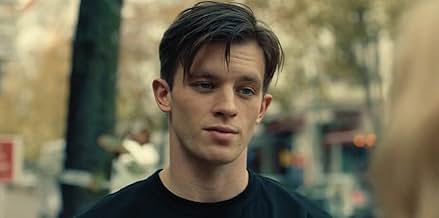IMDb रेटिंग
5.6/10
1.7 हज़ार
आपकी रेटिंग
अपनी भाषा में प्लॉट जोड़ेंMaxi, the survivor of a terrorist attack, joins the beguiling student Karl and becomes part of a European youth movement; one that aims for nothing less than seizing power.Maxi, the survivor of a terrorist attack, joins the beguiling student Karl and becomes part of a European youth movement; one that aims for nothing less than seizing power.Maxi, the survivor of a terrorist attack, joins the beguiling student Karl and becomes part of a European youth movement; one that aims for nothing less than seizing power.
- पुरस्कार
- 1 जीत और कुल 6 नामांकन
फ़ीचर्ड समीक्षाएं
The story slowly grows into a great pathos architected in a very smart way with feelings and weaknesses exploited in directions that are unexpected first and amazingly obvious in the aftermaths.
Drawing on the fears that are often attributed to immigrants, it could be easy to trigger an avalanche effect among the populations of western Europe (and maybe the western world in general) by using the new media in a poisonous way.
This movie is simply genius and does a great job in alerting possible escalations that make you think of how the same situations that brought to the second world war can be made possible today in a different sauce.
Drawing on the fears that are often attributed to immigrants, it could be easy to trigger an avalanche effect among the populations of western Europe (and maybe the western world in general) by using the new media in a poisonous way.
This movie is simply genius and does a great job in alerting possible escalations that make you think of how the same situations that brought to the second world war can be made possible today in a different sauce.
It seems difficult for so many to watch a movie these days simply to be entertained. I found the acting, story line and production to be top-notch. It's not a documentary folks. Just enjoy it!
Summary
Christian Schwochow's film is a disturbingly topical dystopia, an incursion into the renewed modes and operations of the new neo-fascist youth movements in Europe and which find their replicas in other parts of the world, such as the so-called "libertarians" of Argentina. For instance. A pan-European phenomenon with TED conventions and progressive clothes and manners that will reveal, with the excuse of insecurity, his white supremacist motivations against immigrants and his vocation for power. And that raises a question: how solid do our principles stand when we become victims?
Review
After suffering a family loss, Maxi, a young student (Luna Wedler) is seduced by Karl, a young far-right activist (Jannis Niewöhnner) and introduced into a European neo-fascist youth movement.
Maxi is seduced by the beautiful Karl (a Machiavellian Jannis Niewöhnner, in a character reminiscent of the protagonist of Hater) and invites her to meet Re / Generation, an organization for "change". To what extent will someone who is processing a grief allow themselves to be used? Will it follow the path of the protagonist of the film Hadewijch, by Dumont? What ideological changes can the condition of victim produce? Luna Wedler (the protagonist of the Biohackers series) deals with an ambiguity that makes her character very interesting. The opposite of her is Alex, her father (great performance by Milan Peschel), who has other ways of processing a duel that will distance them.
Beyond some script weaknesses, Christian Schwochow's film is a disturbing foray into the renewed modes and operations of the new neo-fascist youth movements in Europe. It should be noted that the phenomenon is not limited to the Old Continent, since it finds its replica in the so-called "libertarians" of Argentina, for example.
We are far from the world of proletarian neo-fascists sons of German reunification. It is now about organizations (in this case the fictitious Re / Generation; attention with its logo) to which middle class young people adhere, many of them students, who organize conventions with TED talks and new age airs, making intensive use of social networks and who spuriously seize slogans, topics and ways of the progressive left. The mask of false progressivism does not take long to fall and show its true face, its obsession and its fanaticism: a pan-European white supremacism whose target is immigrants and which agitates the issue of "insecurity" and "change"; It is a phenomenon that does not end in watertight nationalisms because "they - immigrants - are everywhere." The film, focused on young people, leaves out of the field the economic interests that move behind and that sustain these movements and groups, very organized and with a vocation for power, and who do not repair the means to achieve it.
Je suis Karl describes a real state of affairs and goes one step further, painting a disturbingly topical dystopia.
Christian Schwochow's film is a disturbingly topical dystopia, an incursion into the renewed modes and operations of the new neo-fascist youth movements in Europe and which find their replicas in other parts of the world, such as the so-called "libertarians" of Argentina. For instance. A pan-European phenomenon with TED conventions and progressive clothes and manners that will reveal, with the excuse of insecurity, his white supremacist motivations against immigrants and his vocation for power. And that raises a question: how solid do our principles stand when we become victims?
Review
After suffering a family loss, Maxi, a young student (Luna Wedler) is seduced by Karl, a young far-right activist (Jannis Niewöhnner) and introduced into a European neo-fascist youth movement.
Maxi is seduced by the beautiful Karl (a Machiavellian Jannis Niewöhnner, in a character reminiscent of the protagonist of Hater) and invites her to meet Re / Generation, an organization for "change". To what extent will someone who is processing a grief allow themselves to be used? Will it follow the path of the protagonist of the film Hadewijch, by Dumont? What ideological changes can the condition of victim produce? Luna Wedler (the protagonist of the Biohackers series) deals with an ambiguity that makes her character very interesting. The opposite of her is Alex, her father (great performance by Milan Peschel), who has other ways of processing a duel that will distance them.
Beyond some script weaknesses, Christian Schwochow's film is a disturbing foray into the renewed modes and operations of the new neo-fascist youth movements in Europe. It should be noted that the phenomenon is not limited to the Old Continent, since it finds its replica in the so-called "libertarians" of Argentina, for example.
We are far from the world of proletarian neo-fascists sons of German reunification. It is now about organizations (in this case the fictitious Re / Generation; attention with its logo) to which middle class young people adhere, many of them students, who organize conventions with TED talks and new age airs, making intensive use of social networks and who spuriously seize slogans, topics and ways of the progressive left. The mask of false progressivism does not take long to fall and show its true face, its obsession and its fanaticism: a pan-European white supremacism whose target is immigrants and which agitates the issue of "insecurity" and "change"; It is a phenomenon that does not end in watertight nationalisms because "they - immigrants - are everywhere." The film, focused on young people, leaves out of the field the economic interests that move behind and that sustain these movements and groups, very organized and with a vocation for power, and who do not repair the means to achieve it.
Je suis Karl describes a real state of affairs and goes one step further, painting a disturbingly topical dystopia.
I rated this film 6/10 because of its sensitive and believable build up of how someone might be drawn into "the scene".
Radicalisation of any kind starts with either desperation or charm. The film builds this up slowly and sensitively, with a youth scene which is attractive and seemingly advocating a "new" right movement. This part was well handled and explained. The ending seemed glib, rushed and unbelievable. The actors were charismatic and deserve credit.
Radicalisation of any kind starts with either desperation or charm. The film builds this up slowly and sensitively, with a youth scene which is attractive and seemingly advocating a "new" right movement. This part was well handled and explained. The ending seemed glib, rushed and unbelievable. The actors were charismatic and deserve credit.
Very simple, out-of-the-box story. I think most people can figure it out in no more than 30 minutes. Me too. But then? In for a penny, in for a pound. I kept bingeing it and the the atmosphere got a bit tenser afterwards. With a simple story like this, it's really up to the director and the protagonist to prevent u from getting bored. They've done well. I would say they are above average.
Luna Wedler is a bit overact in certain emotional scenes. Yet, all in all, she is a bright actress and I love her performances in several films including this one.
Luna Wedler is a bit overact in certain emotional scenes. Yet, all in all, she is a bright actress and I love her performances in several films including this one.
क्या आपको पता है
- भाव
Karl: What matters most to you?
Maxi Baier: Trust. What is the worst thing in the world for you?
Karl: To die for no reason.
Maxi Baier: And the best?
Karl: To die with purpose.
टॉप पसंद
रेटिंग देने के लिए साइन-इन करें और वैयक्तिकृत सुझावों के लिए वॉचलिस्ट करें
- How long is Je Suis Karl?Alexa द्वारा संचालित
विवरण
- रिलीज़ की तारीख़
- कंट्री ऑफ़ ओरिजिन
- आधिकारिक साइटें
- भाषाएं
- इस रूप में भी जाना जाता है
- Tôi là Karl
- फ़िल्माने की जगहें
- उत्पादन कंपनियां
- IMDbPro पर और कंपनी क्रेडिट देखें
- चलने की अवधि2 घंटे 6 मिनट
- रंग
- पक्ष अनुपात
- 2.35 : 1
इस पेज में योगदान दें
किसी बदलाव का सुझाव दें या अनुपलब्ध कॉन्टेंट जोड़ें


![Trailer [OVS] देखें](https://m.media-amazon.com/images/M/MV5BMTdjMTA1MjYtYmZkMy00MTE0LTk3MGItYjdhM2M3ZjgxYzNlXkEyXkFqcGdeQXRyYW5zY29kZS13b3JrZmxvdw@@._V1_QL75_UX500_CR0)



























